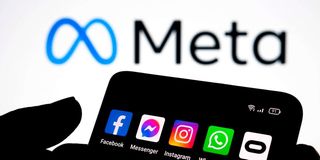How to make money from Facebook following monetisation announcement

Content creators in Kenya will earn money from postings on Meta platforms Facebook and Instagram.
Being popular on Facebook and Instagram can now translate to a fat bank account following Tuesday’s announcement that monetisation will now work in Kenya.
Ever watched a Facebook video where an advertisement ran before the clip started or in the middle of the video? Whoever posted that video got paid for relaying an advert. Kenyans can now earn through having ads run on their videos.
In the Tuesday announcement, Facebook’s parent company, Meta, said ads that will bring Kenyan creators money include pre-roll ads (which play before a video starts), mid-roll ads (which play during videos) image ads (which are still images that appear beneath a video) and post-roll ads (which run at the end of videos).
Reels that people create on Facebook can also bring in money, depending on how the content resonates with the audiences.
Content producer Rose Nyabhate told Nation Lifestyle that the introduction of the ads is a plus for local creators.
“I am looking forward to it. That is something good,” said Nyabhate, who is also a comedian and actress.
“There will be more content. The creativity is there, but it will go a notch higher. There will also be more creation of employment because a person knows they are not publishing something for free,” she added.
President William Ruto, in an X post on Tuesday, asked Kenyan creatives to tap into the new functionality.
“We urge our creatives to take advantage of this opportunity to not only enhance their incomes but also create job opportunities for others,” wrote the President. “We will continue to seek more opportunities for our youth to explore their talents.”
However, Meta has a set of requirements to be met before the category of monetisation available to Kenyans can be available to a user.
The first is that you need a Facebook page. In the absence of a page, you need a personal Facebook account but which has “professional mode” turned on.
Whether it is a Facebook page or a profile on professional mode, it must have at least 5,000 followers.
The second is that you need to have posted videos that were viewed for 60,000 minutes within 60 days before Facebook can have you on board.
Third, you need to have shared at least five eligible videos in the last 30 days before Facebook considers your profile worthy of carrying advertisements.
A trial by this writer returned feedback that he has met three of the five eligibility criteria. The first one is that the writer resides in an eligible country and that the profile has at least 5,000 followers. The two shortfalls are adherence to the platform’s monetisation policies and the requirement for videos watched over 60,000 minutes in the last 60 days.
Given the development, Nyabhate believes there will be more incentive to create videos, noting that there will be more room to market Kenya.
“Because we will be producing more content, our stories will be known. It is the same thing happening with Nigeria. We see their videos all over. Due to this, other people will know about us. Most of the time, ambassadorship comes from content,” said the actress.
In an online lesson on how to earn from its platform, Meta encourages the use of original videos or adding value to existing ones.





